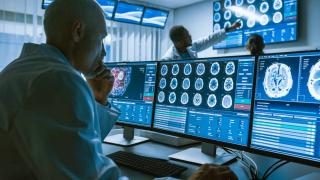Brain and Spinal Cord Injury Research
We are committed to the care of those who are injured today, and to advancing the field so we can continue to improve for the future.
Hennepin Healthcare has a long tradition of providing quality care for patients with all types and severity of traumatic brain injury (TBI) and spinal cord injury (SCI). Clinical research, under the auspices of Hennepin Healthcare Research Institute (HHRI), has been a major part of the neurosurgical trauma program for over 35 years and continues with numerous projects. Current research staff includes:
Walter Galicich, MD, Hennepin Healthcare staff neurosurgeon from 1998-present, current Chief of Neurosurgery and Medical Director of Hennepin Healthcare’s Traumatic Brain Injury Center. Dr. Galicich is active in the Hyperbaric Oxygen Brain Injury Treatment (HOBIT) trial, Cortical Spreading Depolarization After Severe Traumatic Brain Injury, and EE-STAND (Epidural Stimulation After Neurologic Damage) clinical trials.
David Darrow, MD is the Rockswold-Kaplan Endowed Chair for Traumatic Brain Injury, which was created in 2014 to advance research and innovation at the Hennepin Healthcare's Traumatic Brain Injury Center. Dr. Darrow is an Assistant Professor at the University Medical School's Department of Neurosurgery. Dr. Darrow leads the Cortical Spreading Depolarization After Severe Traumatic Brain Injury trial with Dr. Samuel Cramer and is also the Principal Investigator for the E-STAND trial.
Samuel Cramer, MD, PhD is a staff Neurosurgeon at Hennepin Healthcare and Co-Principal Investigator of the Restorative Neurotrauma Lab (RNL) at Hennepin Healthcare Research Institute (HHRI). He is the Co-Principal Investigator of two clinical trials studying Cortical Spreading Depolarizations (CSD) in patients who experience severe traumatic brain injury. Alongside Dr. Darrow, Dr. Cramer serves as a co-PI for the SMART, EDIFY, and DMT trials focused on improving cognitive impairment in patients experiencing mild to moderate traumatic brain injury. Dr. Cramer is also a co-Principal Investigator working on the E-STAND Trial.
Gaylan Rockswold, MD, PhD, former Chief of Neurosurgery (1976-2011) and former Medical Director of Hennepin Healthcare’s Traumatic Brain Injury Center (2006-2015), is the lead Principal Investigator in the HOBIT trial.
Sarah Rockswold, MD is a co-investigator in the HOBIT trial and has also been a key researcher in several hyperbaric oxygen research studies. Dr. Rockswold also has an extensive background in brain injury research at Hennepin Healthcare with a focus on oculomotor (vision) dysfunction following TBI.
More Information
For more information about TBI research or clinical care, please contact the Traumatic Brain Injury Coordinator at 612-873-3284.
Learn more on these pages:
Clinical trials
HOBIT trial
Hyperbaric Oxygen Brain Injury Treatment (HOBIT) trial
The Hyperbaric Oxygen Brain Injury Treatment (HOBIT) trial is a Phase 2 Adaptive, multicenter trial funded by a $10 million grant from the National Institutes of Health. Hennepin Healthcare is one of twelve Level 1 trauma center hospitals nationwide enrolling patients in this TBI study and the only institution involved in this research in Minnesota.
The HOBIT trial centers on how the injured brain utilizes oxygen and studies the use of hyperbaric oxygen (HBO) therapy in people with severe traumatic brain injury. Researchers at Hennepin Healthcare have been investigating the potential of delivering hyperbaric oxygen acutely to patients with severe TBI for 30 years. These many research studies, including NIH funded studies, have set the tone for today’s research and resulted in numerous publications.
Favorable clinical outcomes and mortality rates from severe TBI have not significantly improved over several decades. Statistically, the death rate for individuals who suffer a severe TBI remains at 30-40%, and the percentage of patients who regain meaningful function following a severe TBI remains low. The HOBIT trial is assessing if this treatment can eventually reduce mortality and improve the overall outcomes seen with severe TBI.
Visit the Hyperbaric Medicine webpage to learn more about hyperbaric oxygen treatment and research at Hennepin Healthcare.
Cortical spreading depolarization
Cortical Spreading Depolarization After Severe Traumatic Brain Injury trial
The Cortical Spreading Depolarization After Severe Traumatic Brain Injury trial has the potential to impact the collective knowledge base regarding severe traumatic brain injury. Cortical spreading depolarizations (CSDs), are massive electrical waves that occur after a traumatic brain injury and disrupt brain function. CSDs could cause additional secondary injury to the brain. This study aims to gain an improved understanding of the factors that influence these CSDs. With this knowledge, strategies could be developed to reduce or stop CSDs from occurring, thereby reducing the secondary damage that occurs following a severe impact to the brain. This study is funded through the Minnesota Spinal Cord Injury and Traumatic Brain Injury Research Grant Program.
E-STAND
E-STAND (Epidural Stimulation After Neurologic Damage)
The goal of this trial is to test and optimize the use of spinal cord stimulation to restore volitional movement and other function in patients who have a complete spinal cord injury causing paraplegia. Visit the E-STAND website for more information.
